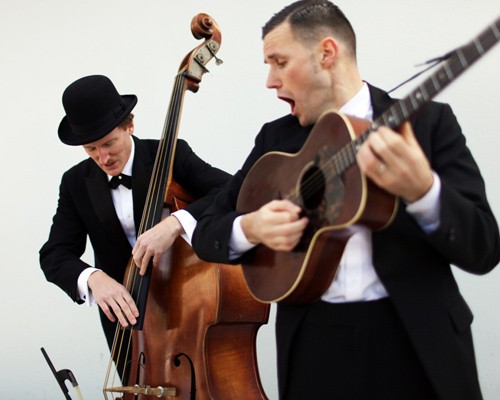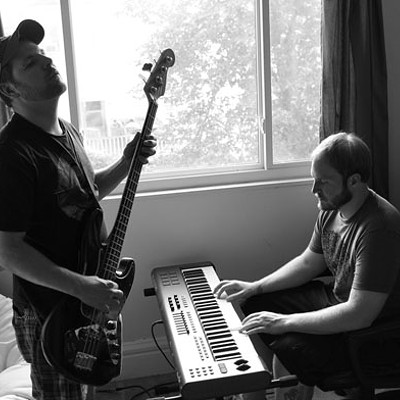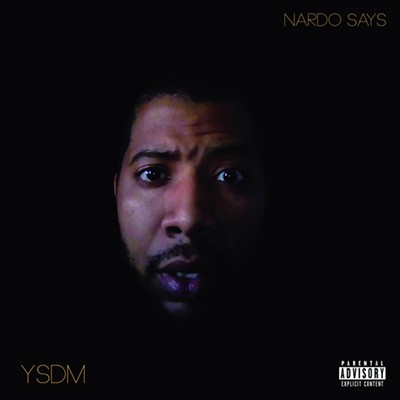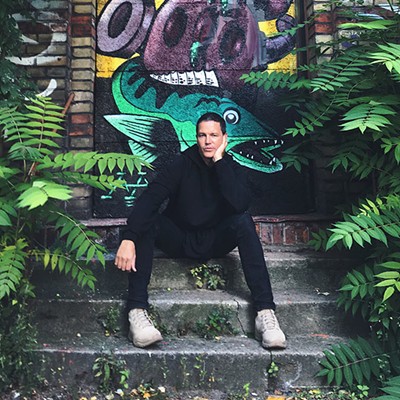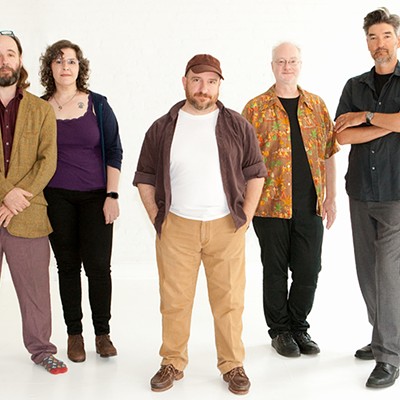Wednesday, August 17, 2011
Extended Q&A: Two Man Gentlemen Band
In today's print edition, you'll find an abridged version of my interview with Andy Bean of The Two Man Gentlemen Band. Since the Internet is endless, I'm giving you a look at the longer version, here! They play Wed., Aug. 24 at Thunderbird Cafe in Lawrenceville; show starts at 9 p.m. and costs $8 in advance, $10 at the door.
Let's start with the obvious question: Why only two of you?
You know, we started off – we were trying to put more of a rock band together, this was around 2002, we were just kids, and we couldn't really find a drummer. So we decided to start just playing, the two of us, and we always loved old-fashioned swing music, and old-time country and rockabilly, so we said if we're gonna be doing the two-man thing, that sounds better than us trying to be a two-man rock band.
We went out kind of on a lark and started playing in Central Park, and people started throwing money at us! So we kept going out there, then we decided to take it on the road, and it all happened kind of naturally. And then when we went to choose a band name, we were so proud of our duo-ness that we chose "The Two Man Gentlemen Band." So, we had no choice but to stay a duo forever.
Then it's ironic if anything changes.
Yes -- we've done some shows where we had guests or a drummer or something, and it just blows people's minds. They can't wrap their heads around a three-person Two Man Gentlemen Band.
And I guess that also means you have to remain gentlemen.
Well, technically we just have to remain a gentleman band. Off-stage, separately, we can behave however we like.
So you were already kind of interested in old-timey music, but it sounds like to an extent, your circumstances led you to the kind of music you play.
Yeah. It was a few years ago, and I feel like starting out, at that point, we could have gone in any direction. But we have catholic musical tastes -- "catholic" meaning "universal" in this case, not church music -- but once we started doing this, I'm glad we did, because it turned out to be our true musical love, for both of us. I don't think I would ever want to be in any other kind of band, besides an old-fashioned swing band. And we've both gotten deeper -- five, six, seven years ago, we both listened to more widely varied music. Now, me, certainly, I just listen to the old stuff, sort of obsessively.
One of the things that seems to come up often in reviews of your shows is the idea that people, especially critics, are wary of your band -- they think it might be a novelty act, might be hokey, might not be good. Then their minds are often changed after they see you. Do you worry about people's preconceptions about your type of music?
It's funny, because, since it's the kind of music we love -- and we're still listening to it on CDs, and in MP3 form -- it seems modern to us. So we forget that it's not normal for musicians to be incredibly well versed in 1920s and '30s styles. So I forget that most people look at us and think that we're old-fashioned and throwback. Because from our perspective, we're taking something older as a basis, and writing new stuff around it. For us it's no different from a folk singer basing their music on The Beatles or Bob Dylan. That stuff's 40 years old; our stuff is just 80 years old. For us – it's weird, once you're in the scene that we're in, there are people who are far more orthodox, especially in traditional jazz bands, about recreating this old thing, and they wear strict period clothing all that. Us, we're just going off this thing that we love, that happens to be 80 years old, and we're writing stuff in that style just because that's what we know how to play. Our suits are not strictly vintage, and certainly our lyrics and such are not strictly vintage either.
So you occupy that space in between a couple of different communities or scenes.
Yeah. Which is why we don't fit flawlessly into any one. Which is an advantage and a disadvantage. But we just gotta do what we do. It's always funny to me when – I get surprised that it's not normal for people to see this 90-year-old style of music.
Do you get a satisfaction from seeing people who think they're going to hate your music, then change their minds and think it's awesome?
Yeah. Our fan base is not any particular type of person. We get a lot of people who, maybe their unifying factor is that they were surprised that they like us. And then we get the vintage enthusiasts too. One of the things that makes me happiest is when people hear our original songs and that makes them go back and look at old Louis Armstrong or Jelly Roll Morton music or something like that. That's very fulfilling.
You have a couple songs about U.S. presidents. Is that an ongoing project, or did that just happen?
It was a thing that just happened. Early in our songwriting career, we leaned toward historical numbers, and we've definitely gotten that out of our system. Because we've concluded that nobody, especially us, wants to hear any songs that are vaguely educational. But, you know, a song about William Howard Taft, or Franklin Pierce – one, those are easy rhymes, and two, you know – "Taft" rhymes with "fat," and he was a big fat guy, and "Pierce" rhymes with "beers," and he was a notorious drunk. So, those songs sort of wrote themselves, we like to say. It's certainly not a project – I don't think anybody wants to hear a song about Grover Cleveland or something like that. Even though, it's funny, people have requested that we write a full album of them. But no. Sorry. That's not our mission. We'd much prefer to write songs about, you know, "I like to party with girls," or something.
I know you've been in Pittsburgh a couple times recently; you tour pretty hard. How many shows do you play a year?
I think for the past three or four years, we've been doing about 175 days a year, which is almost half the year, that's a good clip. Luckily for us, in towns like Pittsburgh and elsewhere, we get a nice reliable, enthusiastic turnout, so I don't think we need to be playing 175 shows a year for the next few years. Something like 75 to 100, that seems more humane. But Pittsburgh is one of our favorite places.
Right, you played Club Café earlier this year?
Yeah, and the past couple of years we've hit Howlers a lot. We're really excited to play the Thunderbird, we heard it's a nice room. It's funny because we were based in New York for a long time, and for years, our Pittsburgh show was either the first show of a tour or the last show. So people either got us rusty and after an eight-hour drive, on the first show of a tour, or completely burnt out from the road on the last show. But this time, we're doing a couple of shows on the way out, so we'll be neither exhausted nor rusty. Make that the headline: "Didn't like The Two Man Gentlemen Band last time you saw them? Give 'em another shot!"
You guys played some dates on the Bob Dylan and Willie Nelson tour?
In 2009, yeah. It was magical. It's still not entirely clear to me how we got 'em, but we got 'em! I read recently that even if it's just for a night or a few nights, Bob Dylan doesn't allow anybody on the bill that he doesn't personally approve of. So I guess in some amount, Bob Dylan has personally approved of us.
How did the rest of the crowd like you?
It was great – the people who go see Bob Dylan shows now, I think, are appreciators of American music. Especially now that he's got that radio show where he plays a lot of Western swing and all. So people who like him now in his later years I think are appreciative. They were very receptive. And Willie Nelson was on the bill, and when we played our song "Me, I Get High on Reefer," people just went bananas.
Obviously, given the nature of the songs, and the instrumentation, everything about your band translates well in a live environment. How do you approach recording?
It's actually a struggle for us to find out exactly how to do it. I think our last record, ¡Dos Amigos, Una Fiesta!, was the best job we've done thus far. We had songs ready, they were prepared, we showed up and just set up some microphones and the record was done in two days. And also, getting even more primitive, we have a 7-inch vinyl record coming in September; for that one, we got a 1940s RCA microphone and we gathered around that, right to a tape machine and that was it. And I think that captured what we're going for pretty well. We seem to be moving toward more primitive, how they used to record back then. The short answer is, I like how records sounded back then, and it's not gimmicky or kitschy to try to make a record that sounds like records you like.


